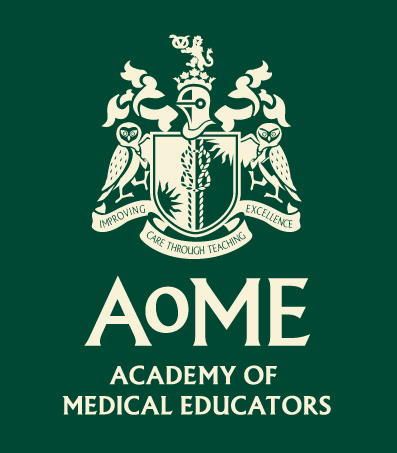Study options
- Starting in
- August 2025
- Location
- Whitechapel
- Fees
- Home: TBC
Overseas: TBC
The course fee is charged per annum for the first 2 years. Note that fees may be subject to an increase on an annual basis - see details on our tuition fees page.
What you'll study
This PGCert Clinical Education (Apprenticeship) has been specifically designed for doctors, dentists, senior nurses, allied health professionals and academics, involved in undergraduate or postgraduate teaching of clinicians. We currently partner with three NHS Trusts to deliver this apprenticeship: Barts Health NHS Trust, Homerton University Hospital Foundation Trust & South London and Maudsley Foundation Trust, and we are happy to partner with other Trusts.
The programme focuses on workplace learning, allowing you to understand the complex relationships between practice and theory, through researching, leading and developing teaching and learning in your own clinical setting.
You will be given opportunities to develop knowledge and skills as educators, using your own practice and workplace setting as a research context. You will engage with like-minded colleagues and analyse the nature and dynamics of teaching and learning in clinical education, drawing on a wide range of educational theories. This programme requires you to become an active researcher of clinical education in order to develop teaching and learning opportunities for students.
On successful completion, you will gain your dual qualification with a Masters level Apprenticeship as an Academic Professional (APA) as well as the Postgraduate Certificate in Clinical Education. You may also wish to continue studying on our MA Education for Clinical Contexts.
Through this programme you will learn how to:
- plan and deliver high quality teaching sessions in a range of clinical and non-clinical settings, including online
- tackle important issues in assessment, including reliability, validity and educational impact
- design courses and curricula for clinical education
- evaluate education sessions, courses and curricula
- research your educational practice
- make an impact in your workplace as a dedicated, expert clinical educator
How to apply
The process to apply for a degree apprenticeship varies depending on whether you are currently employed or an aspiring employee. In order of securing an apprenticeship you will need to:
- Be employed in the relevant job role and the employer support you in the delivery of the apprenticeship
- Meet all of the Queen Mary University eligibility and funding criteria
If you are currently employed and your employer has confirmed they will support you please contact us for further information.
If you are looking for employment we will post vacancies on the programme pages when they are available and make sure to look on the 'Find an Apprenticeship' website where jobs are posted nationally.
Structure
- Three compulsory modules
- End Point Assessment
Compulsory/Core modules
The end-point assessment (EPA) gives the apprentice the opportunity to demonstrate that they have attained the skills, knowledge and behaviours set out on the standard. There are three parts to the end-point assessment: * a written submission * an academic practice assessment (teaching observation) * a professional conversation (viva voce) The assessment will cover all of the knowledge, skills and attributes set out in the Core and Specialist Teacher elements of the Academic Professional assessment plan. There will be opportunities for formative assessment in these three modalities throughout the programme, via self assessment, peer assessment and tutor assessment.
This module covers key aspects of clinical education. These include planning, teaching, assessing and giving feedback. The module will also cover wider areas of clinical education such as motivation, interaction, mentoring and supervision. All these topics will be learned alongside key educational theories and they will be examined through an analysis of relevant literature. Topics covered include: -Reflective Practice -Session Planning -Learning Theories -Observation of Teaching -Evaluation of Teaching -Supervision and Mentoring -Signature Pedagogies -Individual Pedagogies -Individual Learning -Liminal Spaces -Assessment and Feedback You will be given the chance to plan and undertake teaching events and use observation feedback as a reflective tool; you will also have the chance to explore the resources that support successful teaching, and look at how these can be differentiated to meet the needs of specific learners. The module will allow you to relate what you do in your clinical teaching to wider concepts, and will encourage you to enhance your teaching through reflective practice.
Assessment
- Assessments include written assignments, an academic practice assessment (teaching observation) and a professional conversation (viva voce)
- Assessments involve researching and developing clinical education within your own workplace
- End Point Assessment is externally assessed and gives you the opportunity to demonstrate attainment of the relevant skills, knowledge and behaviours
Teaching
You’ll participate in day blocks of teaching. The workshops are designed to generate informed discussion around set topics, and may involve student presentations, group exercises and open discussion.
This Degree Apprenticeship in Clinical Education also focuses on workplace learning, allowing you to understand the complex relationships between practice and theory, through researching, leading and developing teaching and learning in your own clinical setting. Work-based learning is a core element of the apprenticeship programme and will be developed through a range of clinical education sessions and programmes including simulation-based education, clinical skills and communication skills teaching, supervising or mentoring a colleague, leading innovation in clinical education, and maintaining a reflective portfolio. You will be supervised in your work-based setting by an experienced clinical educator, who will guide and provide feedback on your work-based learning while on the apprenticeship.
You will be given opportunities to develop knowledge and skills as educators, analysing the nature and dynamics of teaching and learning in clinical education and therein drawing on a wide range of educational theories.
You will be taught by academic staff who are engaged in scholarship at the leading edge of clinical education. The course team are all active clinical educators themselves, and thus are intensely interested in studying the intricate and sometimes problematic relationship between theory and practice in education.
The direction of individual study will be guided by the formal study sessions attended - along with the overview offered by the reading lists and also the assignments and tutorials. You will take an active role in your own learning, by reading widely, reflecting on and developing, and expanding, your knowledge, understanding and critical abilities.
—The main reason why I wanted to take on this role was to become a better medical educator as one of the key skills and attributes of being a doctor is being able to teach others. The course organisers and administrators on the apprenticeship are great as they are incredibly helpful and informative, and very friendly and approachable.
Sherene Howard-Walker, PGCert Clinical Education, The Royal Hospital
Where you'll learn
Facilities
- Queen Mary’s comprehensive libraries, including the Postgraduate Reading Room
- The book collections within the Queen Mary library system and a range of medical and clinical education journals.
- Other university libraries in the London through the SCONUL scheme
- Access to QMPlus, our bespoke online learning platform
- Access to online library facilities and reading materials
Campus
Your postgraduate learning experience is enhanced by our fantastic location in Whitechapel, in east London.
Not only are we in one of the capital’s most vibrant areas to live and work but we also serve a diverse local community, with 92 different languages spoken by the borough’s 300,000 residents. You will develop your clinical skills and knowledge while caring for this community. Moreover, the Institute offers you many exciting opportunities to develop an understanding of health and the treatment of disease in a global and international context.
About the Institute
Institute of Health Sciences Education
The programme is taught at the Institute of Health Sciences Education (IHSE). The IHSE has a long history in medical and clinical education. In addition to a wealth of advanced courses, it conducts medical education research and evaluations, and leads quality assurance processes.
The Institute is part of the Faculty of Medicine and Dentistry – a leading UK medical and dental school and major faculty of Queen Mary University of London, which is at the forefront of medical education and research. We continue to make a real impact on health-related challenges for the benefit of local and global populations while providing the best in modern medical training. Our academics are leaders in their respective fields committed to sharing their expertise with aspiring clinicians and health professionals.
Career paths
This programme may give you a significant advantage in applying for leadership roles in education. For registrars, it may give you a competitive advantage when applying for positions as consultants.
Graduates of this apprenticeship programme who meet the requirements for the specialist teaching role will develop materials that can then be used to gain professional recognition as a Fellow of the Higher Education Academy.
- 100% of Institute postgraduate taught graduates are in highly skilled work or graduate study (2020/21)
Fees and funding
Part-time study
August 2025 | 15 months
- Home: TBC
- Overseas: TBC
The course fee is charged per annum for the first 2 years. Note that fees may be subject to an increase on an annual basis - see details on our tuition fees page.
Funding
The fee for this course is paid for through contract with the employer.
Entry requirements
UK
Degree requirements
A 2:2 or above at undergraduate level in a relevant medical or health professional degree.
A minimum of one year clinical teaching experience is also required.
Find out more about how to apply for our postgraduate taught courses.
International
English language requirements
The English language requirements for our programmes are indicated by English bands, and therefore the specific test and score acceptable is based on the band assigned to the academic department within which your chosen course of study is administered. Note that for some academic departments there are programmes with non-standard English language requirements.
The English Language requirements for entry to postgraduate taught and research programmes in the Institute of Health Sciences Education falls within the following English band:
Band 4: IELTS (Academic) minimum score 6.5 overall with 6.0 in each of Writing, Listening, Reading and Speaking
We accept a range of English tests and qualifications categorised in our English bands for you to demonstrate your level of English Language proficiency. See all accepted English tests that we deem equivalent to these IELTS scores.
Visas and immigration
Find out how to apply for a student visa.

